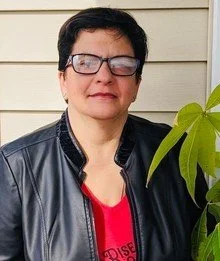Adela M. Brito
Adela M. Brito is a Cuban American writer whose fiction, poetry, and arts reviews have appeared or are forthcoming in The Acentos Review, Litbreak Magazine, Moko Magazine, The Raven Review, The Sandy River Review, The Raven’s Perch, Novus Literary Journal, Compass Rose Literary Journal, Cathexis Northwest Press, Storyboard Memphis, Underwood, All About Jazz, Counterculture UK, and elsewhere. She holds an MFA and teaches literature and creative writing.
Worse Than Death
“I’d rather you be dead than a lesbian.” My mother said these words to me when I was twenty-four. Yes, I still lived at home; Latinos live at home till the day of their wedding. There was no reason for her to suspect that I was gay. At the time, I was still hopelessly getting over a bad break-up with a boyfriend, so it’s unclear why this idea popped into her head. Still, late one evening after I returned from a party two doors down, she said this and nothing else when I entered the kitchen to say goodnight. I had gotten drunk and sick at that party, so I should’ve gotten in trouble for that, had it been obvious to her. A friend accompanied me home, but she didn’t enter and there was no reason to think anything was going on between us. Nonetheless, my mother’s warning left me speechless, felt like a dagger, and it’s been impossible to erase those words from my mind since.
Denial, or simply not knowing, is preferred over acceptance when it comes to children’s imperfections. Men are supposed to be macho, and women should focus on their looks and femininity. When a boy is effeminate, he is called a pajarito, which translates to “little bird,” and this is said in a whisper. Marimacha, the term for tomboy that combines the name Maria – the most common Spanish name – with a feminized macho is used for girls, when it’s still fuzzy on whether they will turn into the more derogatory tortillera, as in two flat tortillas getting it on.
When I was thirty-six years old, I got together with another woman, my closest friend at that time, someone my parents had met once and liked when they came to visit me. The shift in the relationship came as a surprise to me. Still, it felt natural for me to be with her as a person, and not as a woman, and no Catholic guilt or inner turmoil arose in me; it simply was one of life’s twists that defied reason. I was in NYC, a thousand miles from my family in Miami, so it was easy to be open to friends and not with family.
After a year or so, when the relationship seemed to be more permanent than a “phase,” as my sister would refer to it, I flew down for a visit and to somehow weave the news into conversation with my immediate family. I expressed great reluctance to friends beforehand, but they insisted my parents would still love me and that my big sister would, more than anyone, accept me.
“I’m with someone, and it’s not a guy,” I told my sister and brother-in-law. They had met my partner during a visit, too, so I then identified her by name. My brother-in-law expressed surprise, my sister expressed anger and claimed she knew something was going on. The rant that ensued prompted her husband to leave the room from discomfort. “It’s so wrong,” she said as she shook her head. “This is a New York experiment... blah, blah, blah.... The divorced woman across the street is in that phase, too.”
I said it wasn’t a phase, that I waited to tell her for that reason, to make sure. “Well, whatever,” she scoffed. “You gave up because you haven’t met the right guy and you’ve settled for a friend.”
“You’re wrong, but I wanted to be open with you because you’re my sister.”
The next day, she called me to “inform me of a few things.” She would’ve preferred if I hadn’t told her, because “You have your life up there and you don’t come here often, so your life is your business.” She said that, under no circumstances, should I tell her children about this, because “that is not welcome here.” They were young anyway, so I wasn’t planning on revealing anything. My sister’s final warning was, “Do not tell Mom and Dad. It’ll kill them. And I’m the one who lives here and has to deal with them.”
Again, the idea that homosexuality is worse than death was confirmed. For my mother, apparently, my death was preferable, and, for my sister, I’d be the cause of both my parents’ demise. So, I chose to save everyone’s life and keep my newly gay-ish mouth shut.
